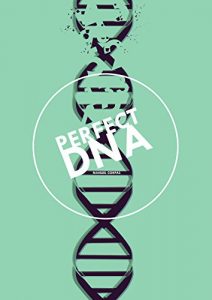Anyone can have his or her genome analysed today.
But no one is prepared for how to deal psychologically or emotionally with an 80% probability of early-onset Alzheimer’s. Or breast cancer. Or autism. Would we plan children earlier? Would we avoid children? Will we now design our children? Would our relationships be tarnished? And, perhaps more poignantly, does having a healthier genome make us superior beings?
Perfect DNA is a novel that uses Dr Manuel Corpas’ own experiences and expertise as genome scientist to begin exploring some of these tremendously challenging issues.
Perfect DNA is set in the mid 2030’s. The main protagonist is John Malcolm, a forty-something average-joe accountant based in London. The sudden death of his father has got him thinking about his own health. On a whim he signs up for a genetic test. This test includes an extensive personality, environmental and genetic survey that predicts fairly accurately the life expectancy of the customer (assuming that no accidents happen).
The novel follows John and his wife Jessica after they get widely different test results. John’s prognosis is brilliant. Jessica’s is the reverse. Traumatised, they seek advice from a genetic counsellor, Professor Riera, who is overwhelmed when he discovers that John has the greatest life score prediction he has ever heard of. He immediately sees the business potential of marketing John’s personal genetic information to pharmaceutical corporations for gene therapy.
Repulsed by the idea, but with his marriage on the line and no money to remedy Jessica’s genetic flaws, John is cornered into considering selling his own genetic identity in order to prolong his wife’s life and ultimately save her from a terrible death.
* Please note that the proceedings made with this book will go to support DNAdigest (UK charity reg. #1154095), which promotes the values of ethical data sharing in genomics.
But no one is prepared for how to deal psychologically or emotionally with an 80% probability of early-onset Alzheimer’s. Or breast cancer. Or autism. Would we plan children earlier? Would we avoid children? Will we now design our children? Would our relationships be tarnished? And, perhaps more poignantly, does having a healthier genome make us superior beings?
Perfect DNA is a novel that uses Dr Manuel Corpas’ own experiences and expertise as genome scientist to begin exploring some of these tremendously challenging issues.
Perfect DNA is set in the mid 2030’s. The main protagonist is John Malcolm, a forty-something average-joe accountant based in London. The sudden death of his father has got him thinking about his own health. On a whim he signs up for a genetic test. This test includes an extensive personality, environmental and genetic survey that predicts fairly accurately the life expectancy of the customer (assuming that no accidents happen).
The novel follows John and his wife Jessica after they get widely different test results. John’s prognosis is brilliant. Jessica’s is the reverse. Traumatised, they seek advice from a genetic counsellor, Professor Riera, who is overwhelmed when he discovers that John has the greatest life score prediction he has ever heard of. He immediately sees the business potential of marketing John’s personal genetic information to pharmaceutical corporations for gene therapy.
Repulsed by the idea, but with his marriage on the line and no money to remedy Jessica’s genetic flaws, John is cornered into considering selling his own genetic identity in order to prolong his wife’s life and ultimately save her from a terrible death.
* Please note that the proceedings made with this book will go to support DNAdigest (UK charity reg. #1154095), which promotes the values of ethical data sharing in genomics.






